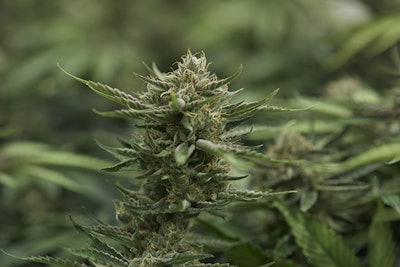
Top Photo: A Lime Sorbet strain grows in Cresco Labs' Illinois facility. The company is one of the five vertically integrated permit holders in Pennsylvania. Photo courtesy of Cresco Labs.
Pennsylvania’s medical marijuana program is rolling out smoothly, industry professionals say—despite litigation, a controversial smoking ban and other bumps in the road.
The state started registering patients at the beginning of last year, said Russ Cersosimo, founder of the Pennsylvania Medical Cannabis Society (PAMCS), and registered patient and physician numbers have been rising.
Just over 10,000 patients have registered with the state to participate in the program, and about 1,200 have been certified by a physician to participate, according to a Dec. 27 press release. Physicians continue to register, as well, with 550 signing up to participate and nearly 250 completing the training program to become certified practitioners, the release said.
“The onboarding has been unbelievable,” Cersosimo said.
Chris Goldstein, Chapter Coordinator at South Philly NORML, however, said the numbers could be higher.
“Ten thousand patients signed up on a waiting list, essentially, at the Department of Health,” he said. “About … 1,200 … worked their way through an interview with a doctor. … There are about 170 approved practitioners in Pennsylvania. That is very small compared to the 50,000 or so physicians in the state.”
Overall, he said, doctors have shied away from the training and registration requirements in Pennsylvania and other states with similar programs.
Examining the Regulations
The state has 17 qualifying conditions, Cersosimo noted, including pain and autism, and Pennsylvania has been driving cannabis research initiatives. The state has a clinical research application process, Cersosimo said, which allows universities to partner with a licensed grower/processor to conduct research studies on patients.
“With our ability to conduct research in the state through the clinical research program, [it will] be very beneficial for people with autism … because now they’re starting to look at cannabis as therapy for that,” he said.
The state will permit no more than 25 growers/processors, and only five can be vertically integrated with dispensary licenses, according to the program’s website. No more than 50 dispensary licenses will be issued.
Laboratories are also coming online, Goldstein noted.
PAMCS is happy with the timeline of the program rollout, Cersosimo said, and added that the state has stayed on course to get medical cannabis to patients by early 2018. In addition, he noted that Pennsylvania broke the rollout into two phases, bringing on only half the growers/processors and half the dispensaries at first, allowing the program to grow before the other half of the businesses become operational.
“It was nice that the state cut that in half and allowed this first group to work their way through the first round and then, as the patient population builds up, we’ll add those other entities to the mix,” Cersosimo said.
“I think PA’s program is going to be very solid, very robust and very well-taken,” he added.
Goldstein said the state may still be preparing a large amount of infrastructure for a small number of patients.
“This is very similar to how the rollout went in New York and New Jersey,” he said. “You saw all the facilities put up against aggressive implementation deadlines by the Department of Health, but because of the doctor registry requirement, you just don’t see patient numbers materialize.”
The Pennsylvania Department of Health was not immediately available for comment.
Facing Challenges
A recent announcement that residents with a gun permit will not be able to obtain a marijuana card and vice versa has caused some tension in the state, Goldstein said. The patient registry is put into the state’s law enforcement database, he added, meaning that police can presumably cross-reference the patient list when they do a background check for firearms and exclude those patients from obtaining a gun.
“It’s another reason that we find patients don’t register is they don’t want to be on a list, they don’t want to lose their firearms, their housing—they just don’t want to be on a list,” Goldstein said.
Cersosimo, on the other hand, said the gun issue should not be a major area of concern.
“Our governor has stated that our police aren’t going to be looking to find people and take their guns away from them, so nothing to worry about, but it is something that federally is coming up,” he said.
There have also been a few lawsuits filed in the state over the awarding of licenses and municipal zoning issues, Goldstein said, but Cersosimo is confident that the litigation will not hold up the rollout of the program.
“[The regulators have] been on pace for everything,” he said. “I have no reason to believe that this would slow it down.”
Another issue in the state is the ban on smoking, Goldstein said.
“We have a no-smoke marijuana law, … which means the products will only be refined oils, topical creams and vaporizable things like hash oil and cartridges,” he noted. “Unfortunately, I think we’re going to find in states that push no-smoke marijuana laws like Pennsylvania, ultimately patients won’t get access to whole flower until full legalization comes because these programs are very, very strictly regulated.”
The Prospect of Adult-Use Legalization
The medical cannabis permit holders in the state likely have their eye on full legalization, Goldstein said, as it will increase patient access and make them more profitable than they might be under the current limited medical program. Legalization seems possible soon, he added, as Delaware, New Jersey and Ohio are all moving in that direction.
“Pennsylvania will literally be surrounded by legalization,” Goldstein said.
“I think adult-use is something that’s just a natural progression,” Cersosimo added. “I would say three years after the medical program comes on board, it makes it easier for the adult-use to come.”
Seven Pennsylvania cities have passed decriminalization ordinances, Goldstein said, including Philadelphia, Pittsburgh, York and Harrisburg.
“We hope to dovetail that into state reform,” he said. “NORML chapters in Pennsylvania have been the engine of marijuana reform.”
“I think the big thing is, we’re on pace, it doesn’t seem to have slowed up,” Cersosimo added. “We have a high patient count. We have an absolutely phenomenal physician count. Our caretaker count is way up, so all in all, it’s all positive and the program’s moving forward.”
Businesses Become Operational
Josh Richman, SVP of sales and Marketing for Franklin BioScience, which will have dispensary locations in Pennsylvania and currently operates cannabis businesses in Colorado and Nevada, said the company chose to expand into the state due to its pharmaceutical talent and its focus on education, which plays into Franklin BioScience’s focus on wellness-based cannabis products that are backed by science. The company has partnered with University of Sciences to help strengthen education, research, training and employment opportunities in the industry through the development of educational programming and research, according to a company press release.

Franklin BioScience's grow facility in Denver, Colo. Photo courtesy of Franklin BioScience.
Franklin BioScience’s first Pennsylvania dispensary will open in the Bristol area, near Philadelphia, in March, Richman said, and the company is looking at other real estate opportunities in its designated southeast region. Real estate can be hard to come by, he added, due to restrictions on how far away dispensaries must be from schools and playgrounds.
Dispensaries are also required to have a pharmacist on staff at all times, Richman noted.
“It’s a much different game than a budtender in Colorado being a frontline staff,” he said.
In addition to the smoking ban, Richman said there is also a ban on sugar in cannabis products, which essentially bans gummies.
Franklin BioScience’s produces tablets in other states, he said.
“We’re going to take that and move it into Pennsylvania and the other states we’re in and deliver that device,” he added.
The company wants to focus on increased product quality, quality consumer education and patient conversation, Richman said. It also strives to educate doctors and patients on the benefits of cannabis, Richman said, and plans to host education events in the state and partner with medical communities and scientific professionals to spread information.
“Longer term, we are … driven towards … wellness and eventually ailment-specific intellectual property and research,” Richman said.
Cresco Labs, a Chicago-based cannabis operator, has also launched into Pennsylvania’s market as one of the state’s five vertically integrated companies, and is permitted to have three dispensary locations in addition to its cultivation facility, according to CEO Charlie Bachtell.
Cresco will offer a full suite of the available products currently allowed by the state, Bachtell said, including concentrates, vaporizing pens, tinctures, topical lotions and capsules. The company boasts experience in other tightly regulated medical marijuana states, as well as experience in manufacturing, legal issues and compliance, which helped it become the first company deemed operational by the state, Bachtell said. The company expects its first harvest in a few days, with product available in the first weeks of February.
“At the end of the day, you have to remember that this is a medical program and it exists to provide medicine to registered patients in that state, so the sooner we can all get everything completed from a production standpoint and from an operational standpoint, the sooner patients can get medicine in their hands,” he said. “It’s important.”

Plants growing in Cresco Labs' Illinois facility. Photo courtesy of Cresco Labs.
From a regulatory standpoint, Bachtell said the program rollout is going well.
“The regulators there have done a phenomenal job of staying ahead of it and working with all of the different stakeholders, which include us as the operators on both sides—cultivation and dispensing—and trying to come up with solutions to whatever the nuances or problems might pop up, coming up with reasonable, practical solutions that have the best interests of everybody in mind—patients, the state, and operators,” he said. “They’ve been good at dealing with the curveballs that are always going to occur.”
He added that the focus should be patient access, ensuring that the process of registration, doctor certification and issuing ID cards runs smoothly. Increased access to additional forms of cannabis would be a nice improvement to the program, Bachtell said, and he thinks flower and edibles will be added in the future.
“So far, so good in Pennsylvania,” Bachtell said. “They’ve got good numbers. They’ve got great interest. You can see the registration of patients getting through the system and cards getting issued. It looks like they’re doing a really good job with it.”


























